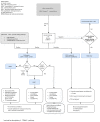Hereditary diffuse gastric cancer: updated clinical practice guidelines
- PMID: 32758476
- PMCID: PMC7116190
- DOI: 10.1016/S1470-2045(20)30219-9
Hereditary diffuse gastric cancer: updated clinical practice guidelines
Abstract
Hereditary diffuse gastric cancer (HDGC) is an autosomal dominant cancer syndrome that is characterised by a high prevalence of diffuse gastric cancer and lobular breast cancer. It is largely caused by inactivating germline mutations in the tumour suppressor gene CDH1, although pathogenic variants in CTNNA1 occur in a minority of families with HDGC. In this Policy Review, we present updated clinical practice guidelines for HDGC from the International Gastric Cancer Linkage Consortium (IGCLC), which recognise the emerging evidence of variability in gastric cancer risk between families with HDGC, the growing capability of endoscopic and histological surveillance in HDGC, and increased experience of managing long-term sequelae of total gastrectomy in young patients. To redress the balance between the accessibility, cost, and acceptance of genetic testing and the increased identification of pathogenic variant carriers, the HDGC genetic testing criteria have been relaxed, mainly through less restrictive age limits. Prophylactic total gastrectomy remains the recommended option for gastric cancer risk management in pathogenic CDH1 variant carriers. However, there is increasing confidence from the IGCLC that endoscopic surveillance in expert centres can be safely offered to patients who wish to postpone surgery, or to those whose risk of developing gastric cancer is not well defined.
Copyright © 2020 Elsevier Ltd. All rights reserved.
Conflict of interest statement
PRB reports personal fees from AstraZeneca, Janssen and Roche Diagnostics and non-financial support from GENETICANCER, outside the submitted work. DGH is founder and CMO of Contextual Genomics. The work of Contextual Genomics in no way overlaps with the topics of this review. LZ received other support from Future Technology Research LLC, Roche Diagnostics Asia Pacific, BGI, and Illumina, outside the submitted work. A family member of LZ has a leadership position and ownership interest in the Shanghai Genome Center. All other authors declare no competing interests.
Figures


References
-
- Guilford P, Hopkins J, Harraway J, et al. E-cadherin germline mutations in familial gastric cancer. Nature. 1998;392:402–05. - PubMed
-
- Hansford S, Kaurah P, Li-Chang H, et al. Hereditary diffuse gastric cancer syndrome: CDH1 mutations and beyond. JAMA Oncology. 2015;1:23–32. - PubMed
-
- Lecuit T, Yap AS. E-cadherin junctions as active mechanical integrators in tissue dynamics. Nat Cell Biol. 2015;17:533–9. - PubMed
-
- Majewski IJ, Kluijt I, Cats A, et al. An alpha-E-catenin (CTNNA1) mutation in hereditary diffuse gastric cancer. J Pathol. 2013;229:621–9. - PubMed
-
- Lowstuter K, Espendchied CR, Sturgeon D, et al. Unexpected CDH1 Mutations Identified on Multigene Panels Pose Clinical Management Challenges. JCO Precision Oncology. 2017;1:1–12. - PubMed
Publication types
MeSH terms
Grants and funding
LinkOut - more resources
Full Text Sources
Medical
Miscellaneous

